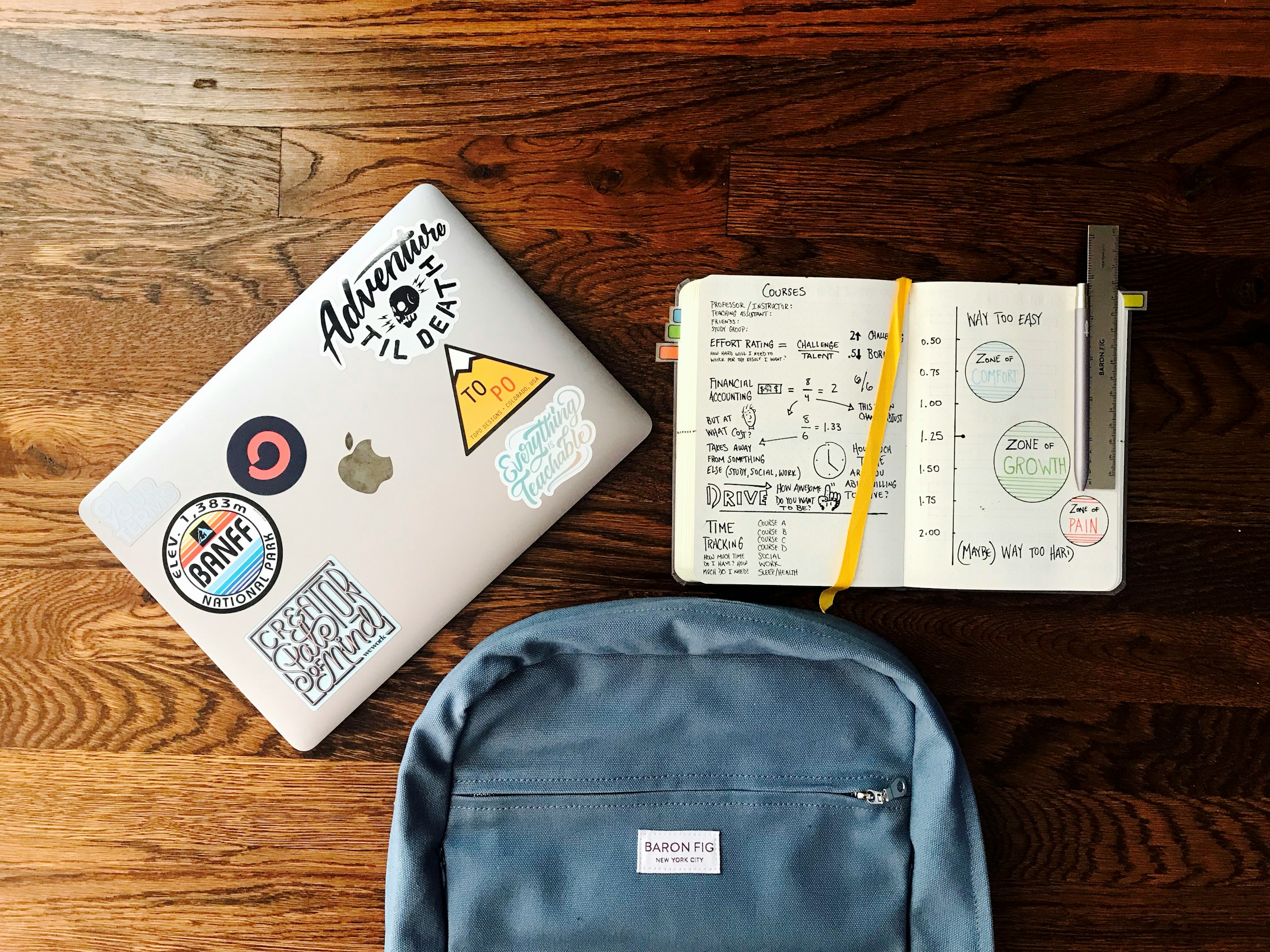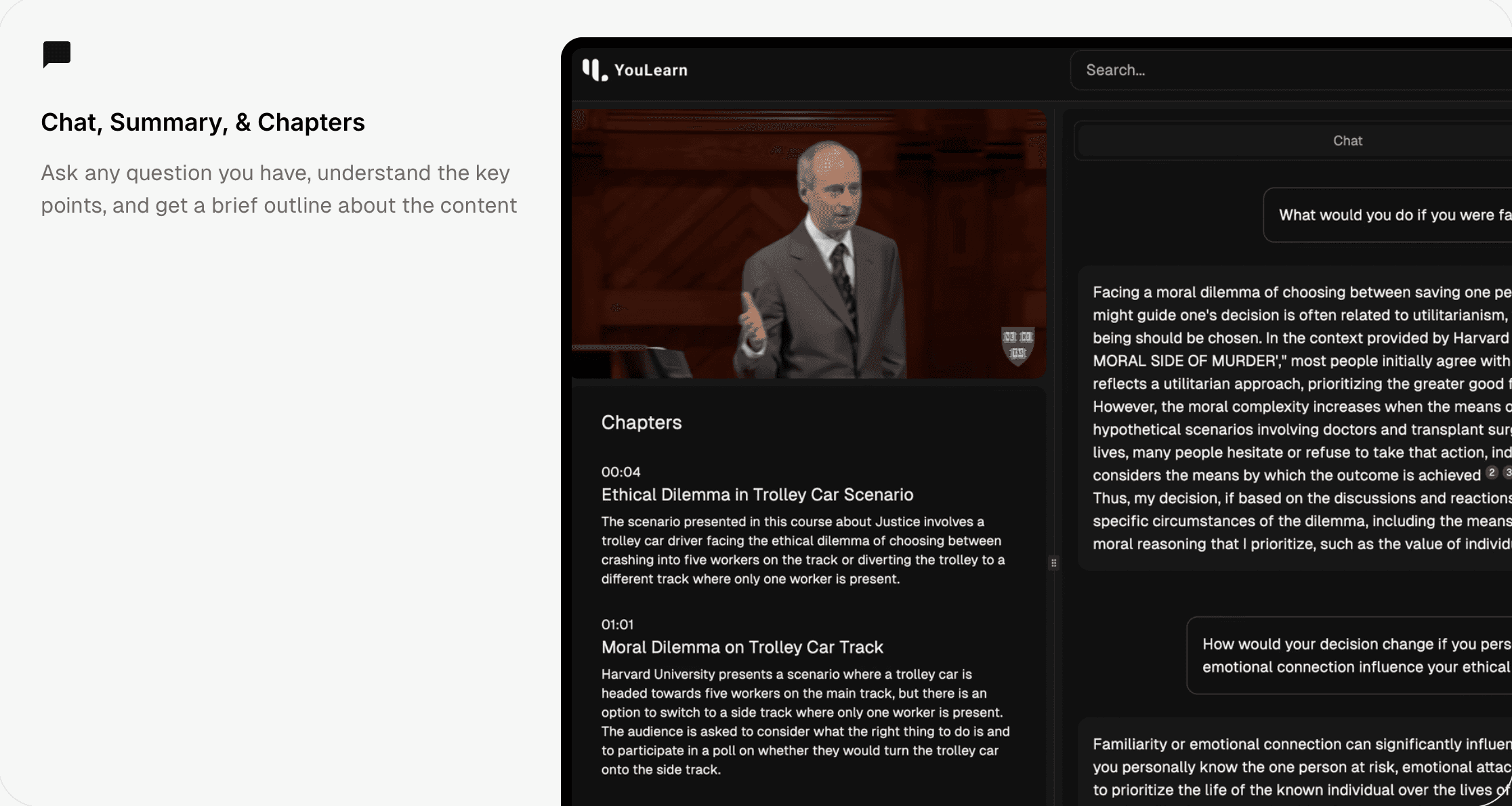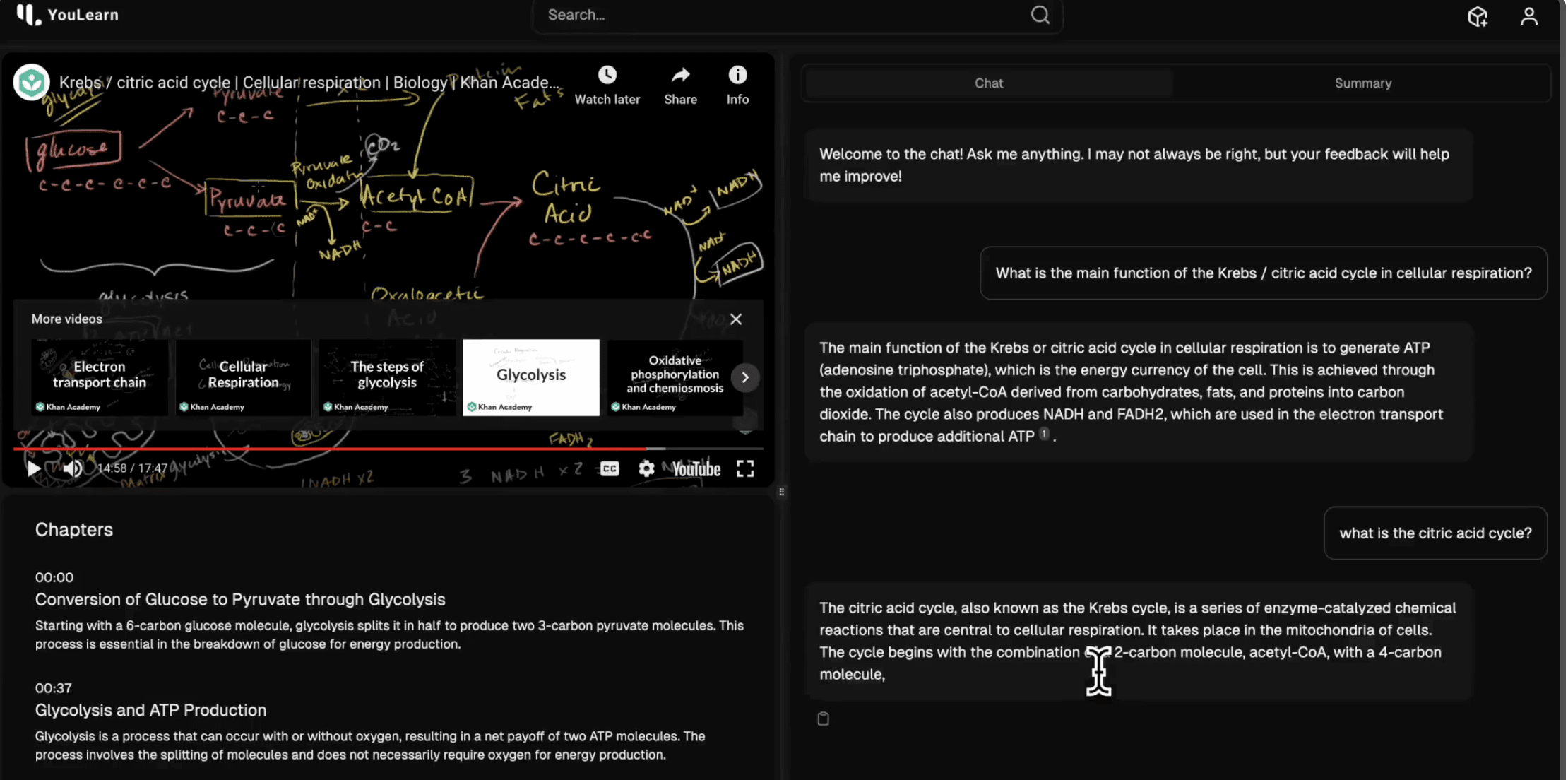31 Useful High School Tips Every Student Must Follow
Sep 26, 2024

YouLearn Team
High school is a tough transition for many students. For some, it’s like a new world with different classes, teachers, and social dynamics. You may struggle to keep your head above water in this unfamiliar environment. If that sounds like your current situation, you’re not alone. Luckily, there are proven strategies to help you adjust to high school life and improve your academic performance. This guide will give you some practical tips on how to be a better student in high school.
One way to help you adjust to high school is to get personalized academic support tailored to your unique needs and preferences. YouLearn’s personal AI tutor can help with that. This tool provides instant assistance to improve your understanding of complex subjects and concepts.
Table of Contents
How Can I Get Better At High School

If your grades are lower than you’d like them to be, don’t fall into a rut. Instead, start believing in yourself. Focus on the fact that you can improve with hard work. Set goals and use them to motivate yourself to do better in school.
Don’t Be a Wallflower: Listen and Participate in Class
Class participation is another way to improve your grades. The more you participate in class, the better your understanding of the material will be. Also, teachers notice who participates and who does not. If you are shy, it may be hard to speak up in class. To gain confidence, write down questions you have before class starts and ask them during the period. Another trick is to sit closer to the teacher to get to know them better.
Take Good Notes in Class
Taking thorough notes in class can help you improve your grades. When you take notes, you do not miss any critical information that can help you on tests and assignments. Also, note taking is a skill that will help you in college and beyond.
Ask for Help
Don’t hesitate to ask for help if you are struggling with schoolwork. Talk to your teacher or classmates about your concerns after class. You can also ask your parents if they can hire a tutor to help you.
Stay Focused During Homework
When it comes time to do your homework, find a quiet place free from distractions to work. Put your phone away and even consider using apps that lock you out of your phone for a certain period so you can focus.
Take Breaks While Studying
Studying for long periods can be monotonous. Instead of cramming, break up your studying into smaller chunks. Take a 15-minute break after each 45 minutes of studying to allow your brain to rest. Go for a walk, get a snack, or reward yourself with something you enjoy. This will help you stay focused and retain information better.
Study with Peers
Consider forming a study group with your classmates. Studying with peers can motivate you to do better and be more productive. You can either organize your group or join an existing one.
Get Organized
Keeping your study space organized can help improve your focus. Use one notebook per class to avoid confusion. Don’t make your desk cluttered with papers and stationery. Try to clean up your desk regularly to limit distractions.
Use a Planner
An excellent way to stay organized in school is to use a planner. You can use either a paper planner or a mobile app. I recommend using a paper agenda book so your phone does not distract you. Write down all important due dates, test dates, and extracurricular activities.
Develop a Study Schedule
If you are preparing for a test or writing a research paper, break down your work into small chunks and allot work to a specific period. To avoid stress, do not procrastinate and wait until the last night before the test.
Take Care of Your Health
Make sure that your meals are nutritious, balanced, and varied. Your brain needs fuel to be productive. Never miss breakfast before school.
Sleep Well
Establishing a regular sleep schedule is crucial for studying and learning to get good grades in high school. Try to wake up, go to bed simultaneously, and get at least 8 hours each night.
Stay Fit
Exercise daily, join a sports team at school, or participate in sports-related extracurricular activities outside school.
Related Reading
• How to Pass a Test
• How to Be a Good Student
• Back to School Tips
15 Useful High School Tips Every Student Must Follow

1. Supercharge Your Study Skills with YouLearn AI
Meet your new personal AI tutor: YouLearn. The free tool helps you learn faster and more effectively by transforming YouTube videos, PDFs, and slides into an automated study guide. Upload your content to YouLearn, and our AI will chat with you about the material, provide quick summaries, and transform information into digestible chapters. The interactive learning experience helps students grasp complex topics quickly so they can study less and understand more.

2. Develop Good Study Habits
Effective study habits are crucial for success in high school. Find a study method that works for you, create a schedule, and stick to it. Over time, I have discovered several effective study methods that can benefit students. Active studying involves engaging with the material by taking notes, highlighting important passages, summarizing key ideas, and posing questions.
Another valuable strategy is working through practice problems, which can reinforce key concepts and help identify areas needing further review. By incorporating these and other proven techniques, students can make the most of their study time and achieve tremendous success in their academic pursuits.
3. Pick Interesting Electives
Choosing electives should be fun! Pick classes that spark your interest. Electives are an excellent way to discover what you do and don’t like. The sooner you take a wide range of courses, the sooner you’ll start figuring out what you want. This could lead to a new hobby or even a future career! When filling out your class schedule, ask yourself: Do any of these classes relate to things I’m already interested in? What could be a good challenge for me? During course selection, sit down with your high school guidance counselor to discuss your academic goals. If you want to take advanced courses, ask them about AP classes and their passing rates.
4. Get Involved in Extracurricular Activities
Joining extracurricular activities opens up opportunities for personal growth and skill development. Whether you join clubs or teams, such as sports teams or student organizations, you can meet new people, develop skills, and explore your interests. For example, participating in a sports team improves teamwork and physical fitness, while engaging in community service develops empathy and leadership skills.
School clubs, community centers, and online platforms like Meetup and VolunteerMatch are great resources for finding extracurricular activities that align with your interests and goals. Embracing extracurricular activities can enrich your life, expand your horizons, and provide valuable experiences outside the classroom.
5. Eat Healthy and Stay Hydrated
Our brains and bodies need proper nourishment to focus properly during the school day. Prioritize eating well and staying hydrated. This is one of the best tips for 9th graders! The earlier you start forming good habits, the more helpful they will be. Get into the routine of eating well and staying hydrated while you are a high school freshman. Pack a lunch or bring lunch money, along with a water bottle. If you are experiencing financial hardship, ask someone in the admissions office about options for financial assistance.
6. Take Care of Your Physical and Mental Health
High school can be stressful, but taking care of your physical and mental health is essential. Get enough sleep, eat well, exercise, and seek help if you're struggling. Regular exercise has been found to have numerous benefits for secondary school students, according to a 2019 study published in the Journal of School Health (Kwan et al., 2019, p. 904). Incorporating physical activity into secondary schools' daily routines is recommended to promote better health and academic outcomes for students.
7. Sleep Well
Sleep is essential for high schoolers. Go to bed and wake up at the same time every day. This will help your body adjust so you get the most health benefits. Sleeping well improves your mood and outlook and lets you focus on schoolwork. Did you know your brain processes memories while you’re asleep? This is why going to bed early before a big test is so important. Make a routine for yourself. Go to bed early. Challenge yourself to put away your phone an hour before bedtime to improve the quality of your sleep by limiting distractions.
8. Embrace Failure as a Learning Opportunity
Failure is a natural part of the learning process. Instead of fearing it, embrace it as an opportunity to learn and grow. Embracing failure as a learning opportunity requires adopting a growth mindset and understanding that failures are part of the learning process, not indicators of personal worth. By embracing failure, you can extract valuable lessons from mistakes and make better choices in the future. It also builds resilience, allowing you to bounce back from setbacks and challenges.
Embracing failure cultivates perseverance, motivating you to persist in adversity. It fosters innovation and creativity by encouraging you to take risks and explore new approaches. Overcoming fear and self-doubt becomes possible as you recognize failure as a natural part of growth. Embracing failure also promotes continuous improvement as you seek feedback, reflect on experiences, and adapt to changing circumstances. Ultimately, embracing failure empowers you to learn, grow, and achieve your goals.
9. Start Setting Goals Freshman Year
Start setting goals now. Talk to your teachers and guidance counselors about college applications and what you’d like to do after high school during your freshman year. It’s good to start thinking about your goals for senior year and college admissions right away. This will help you feel more prepared during your senior year.
10. Get to Know Your Guidance Counselor
Your guidance counselor is there to help you succeed. Introduce yourself! After all, freshman year is full of challenges. Use your guidance counselor and the resources they provide to reach your goals. Schedule an appointment. Greet them in the hallway. Building a relationship with your guidance counselor early will only set you up for success!
11. Write Down Your Assignments
Write down all of your assignments. This will ensure you are organized and that nothing slips through the cracks! After all, you don’t want to attend class and realize you forgot to study for a test or thought you had an extra day to write that big paper. Writing down all of your assignments is one of the most essential tips for freshmen in high school. As a freshman, avoiding procrastination and practicing staying organized is critical. Many schools provide you with an organizer. Use it! If one isn’t offered, consider buying one of your own.
12. Build Strong Relationships With Teachers and Mentors
Teachers and mentors can provide guidance, support, and advice. Take the time to build relationships with them and seek their help when needed. High school students can build relationships with teachers and mentors by contacting them in person, via email, or through online platforms like LinkedIn. They can also attend school events, join clubs, and participate in community service opportunities to network and build relationships with teachers, peers, and professionals in their areas of interest.
13. Attend All Your Classes
Attendance counts. By attending all of your classes, you are giving yourself the best chance to succeed. Skipping classes is a bad habit you want to avoid, especially during your freshman year! If you habitually miss classes, your teachers will become frustrated, and you’ll fall behind in the material. Poor attendance may also affect your grade. So, manage your time wisely, stay organized, and make time to hang out with your friends after school.
14. Do Your Homework
Homework prepares you for class. Not only does doing your homework help you get good grades, but it also helps you keep up with the material. You’ll be less likely to feel lost. And if you’re struggling, your teachers will be able to help you. Yes! By looking at your homework.
Homework also enables you to develop life skills like organization and time management. These skills take practice, so start your high school experience strong by prioritizing your homework. Make a schedule for yourself. When do you feel most productive after school? Maybe you should do your homework as soon as you get home. Or perhaps you need an hour or two to rest and refocus. Figure out what works best for you!
15. Be Productive During Study Hall
Study hall can be conducive during your freshman year. Take the extra time to organize yourself and get a head start on homework. Write a list of assignments due the next day at the beginning of your study hall. Pick out the assignment that feels most manageable at the moment and get started. Study hall is meant to be helpful, so use it! You’ll thank yourself at the end of the day when you have more time to relax and enjoy yourself.
How Do You Get Top 10% In High School

1. Make Academics Your Top Priority
Academics should be your primary focus to boost your class rank. This means getting the best grades possible in your classes, and if you find yourself struggling, seek extra help immediately. This might mean attending after-school tutoring, asking your teachers for guidance, or forming study groups with classmates.
2. Challenge Yourself with Rigorous Courses
While maintaining solid grades is essential, you should take AP, honors, or dual-enrollment classes when ready. Colleges often give more weight to challenging courses, so taking them can help your rank and show colleges that you're challenging yourself academically.
3. Manage Your Time Effectively
Balancing schoolwork, extracurriculars, and social life isn't easy, but effective time management is critical. Set realistic goals, create a study schedule, and prioritize tasks to keep yourself on track.
4. Develop Strong Study Habits
Use effective study methods, like spaced repetition, summarizing and note-taking techniques, and active learning methods to maximize your academic success.
5. Get Organized
Keep track of assignments, tests, and deadlines in a planner or digital tool. It's easier to stay on top of your work when you know what's coming up and when it's due.
6. Get Involved Outside the Classroom
While class rank is mainly about your academic performance, colleges also consider your extracurricular activities. Pursue your interests and passions outside the classroom, seek leadership positions, and try to make an impact on your community.
7. Seek Advice and Support
Talk to your school counselor or teachers for guidance on improving your class rank. They know the ins and outs of your curriculum and can help you make informed decisions about your academic path.
8. Stay Motivated and Persistent
Self-motivation and resilience are crucial to reaching your goals. Maintain a positive attitude, set achievable goals, and remind yourself of what you're working towards.
YouLearn Is Your AI Tutor

YouLearn is your AI tutor, designed to supercharge your learning from YouTube videos, PDFs, and slides. Our AI chats with you about the content, provides quick summaries and breaks information into digestible chapters. Whether you are a college student or a self-learner, we help you grasp material faster and more effectively.
Just upload your content, and our AI transforms it into an interactive learning experience. With YouLearn, you're set to learn more intelligently, not more complicatedly. Learn anything with ease for free today with YouLearn's personal AI tutor.
Related Reading
• Tips for School
• How to Do Good in School
• College Study Tips
• Best Study Method
• Study Strategies for High School Students
• Active Study Methods
8 Best Smart Study Tips For High School Students

1. Boost Your Learning With YouLearn AI
YouLearn is an artificial intelligence tutor made to help you study smarter, not harder. The free YouLearn platform creates interactive learning experiences from YouTube videos, PDFs, and slides. You simply upload your content, and the AI works, breaking down the information into digestible chapters, providing quick summaries, and chatting with you about what you’re learning. YouLearn is perfect for any learner, from high school students to college attendees and self-directed adults. With YouLearn, you’ll grasp your study material faster and more effectively.
2. Develop a Study Plan and Stay Organised
Cramming for exams is the worst. Sure, it’s nice to have a last-minute way to review what you’ve learned before a test. But if you genuinely want to understand and remember the material long-term, you must space out your studying. Research shows that staying organized and developing a study plan to help you revise over time is far more effective than leaving everything to the last minute. Start by creating a study schedule as soon as you can.
Use a planner or digital calendar to keep track of important dates and deadlines so you know what you need to study and when. Aim to set goals for yourself at the start of the year, term, or semester. Having a clear objective will help you stay focused and motivated, particularly when you don’t feel like studying.
3. Practise to Improve
Practicing what you learn helps improve memory recall and promotes understanding. For instance, if you wanted to learn to play the guitar, you’d likely start by watching a few tutorials. While this is helpful to gather information, it wouldn’t prepare you to pick up the guitar and play. You’d need to practice what you learned to improve your skills and sound good. Treat your studies the same way.
Incorporate past practice tests into your study schedule to improve your performance when it’s time for the real thing. You could also write your flashcards with questions on one side and answers on the other. Testing yourself often or having others test you on the information can also be helpful. Finally, don’t hesitate to ask your teachers to write you some examples or revision questions.
4. Use Visuals to Help You Learn
Reading lengthy textbooks and notes can be tedious. If your mind wanders while studying, it’s time to change your approach. Instead of trying to power through the reading, start with diagrams, graphs, and other visual materials. Then, if you need to, add notes or explanations to help you expand your learning. Make it as intricate or simple as you like; the important thing is finding a way to represent the information you can recognize at a glance. You could even have a go at sketching (and if you’re not artistically inclined, don’t worry – you don’t have to be great at drawing for it to be effective).
5. Mix It Up for Better Learning
When planning your study schedule, it’s tempting to revise each subject in a block, move on to the next, and never look back. But imagine you’re learning to play tennis, and for the first four months, all you do is learn forehand. Next, you learn backhand. Then, finally, you’re onto learning volleys. This style of learning is called blocking. Sure, you’ll eventually learn all the skills…but it can get kind of boring, and it’s not reflective of what an actual tennis game involves.
This is where another learning technique called interleaving comes in. Studies have suggested that interleaving can produce much better and longer-lasting benefits. It involves switching between related topics, training your brain to learn the information, and making connections. Are you not convinced? In one study, students were given homework sheets using either the blocking or interleaving methods. When tested one day later, the students trained with interleaving scored 25% better.
When they were tested one month later, the interleaving advantage grew to 76%. Go over the material you’ve learned at different times throughout the term instead of revising once and leaving it behind until exam time. For example, each time you learn a new topic, put a reminder in your calendar or phone to go over the material again in 2, 4, and 6 weeks.
6. Learn From Your Mistakes
Everyone makes mistakes, especially when you’re learning new things. But instead of letting it get you down, you can turn your mistakes into a learning tool. Understanding where you went wrong and how to correct your answers is an excellent way of focusing on your problem areas. Keep time in your study plan to review the material and check for mistakes. When you do homework or practice tests, ask your teacher for feedback – they can help you better understand exactly how to complete a specific task or give you ways to improve your responses.
7. Ask Questions
Simply reciting long lists of facts and figures by heart doesn’t necessarily show a deeper understanding of a topic, which is often what teachers want to see in your exams. But giving those facts and figures more context could make things easier to remember and improve my answers. The simplest way of doing this is just to ask questions. Ask your friends what they know about the topic, quiz your parents, or even do some searching online (just don’t get too distracted). Doing this will expand your knowledge of a topic beyond simple recall and expose you to concepts or interpretations you hadn’t thought of before.
8. Don’t Hesitate to Ask for Help
If you’re struggling with a concept or subject, don’t hesitate to ask for help. We get it; asking for help isn’t always easy, especially if you have high expectations of yourself or you’re too embarrassed to admit you don’t understand something. But even though school is important, your health and well-being always come first, and it’s not worth the stress and anxiety.
If you’re unsure, don’t leave it to the last minute to ask for help. Whether it’s letting your teacher know I’m struggling, joining a study group, or seeking tutoring assistance, there are heaps of people out there who are more than happy to help you – all you need to do is ask.
Mistakes to Avoid As High School Students

1. The Slippery Slope of Inconsistency
Students often start strong, preparing a timetable that balances academics, free time, and other activities. However, they usually stop following the timeframe as the school year progresses. They think, "I followed it yesterday or the day before. Missing one day on the timetable won't be a big deal." Before you know it, you don't remember the schedule you planned for yourself, and all your plans to stick to a regimen will go awry.
This behavior makes it impossible for students to catch up with the time they lost when things start piling up, and they feel overwhelmed. Fighting these urges can be challenging, but it's worth it once students remind themselves that any new practice or habit takes time.
2. Being a Bookworm Isn't the Best Approach
It is nice to be studious; however, being a bookworm is not the best way to go about it. You can pursue many activities in high school, and you shouldn't miss that opportunity. Those activities can help you decide where your genuine interest lies. These are the golden years where students can make mistakes and learn from them, exploring their options. So don't just limit yourself to academics. Try to socialize, be spontaneous, sporty, and not too hard on yourself.
3. Stop Being So Hard on Yourself
In high school, you will tend to take things seriously or at least be expected to. But you only need to do your studies and other activities at your best. It doesn't matter what others think if it's enough for you. Knowing your limits and accepting when something is too much is one of the bravest and most mature things you'll require and develop as a student.
4. Limiting Knowledge to Just Academics
One of the students' most significant mistakes in high school is relying only on academic knowledge and limiting themselves to it. This is repetitive advice, but reading truly helps broaden your horizon. The books you read don't necessarily need to be informative. Even fictional or fantasy books enhance your imagination and vocabulary. Reading is one of the best ways to improve vocabulary while learning new things. Opening yourself up to new activities and hobbies can bring variety to your knowledge and perspective that you can use academically and outside.
5. Overcoming the Fear of Asking for Help
One of the biggest obstacles students face is asking for help when needed. This could be because they think their question is not intelligent enough or foolish, which could make it embarrassing for them to ask about it. This fear is not entirely irrational, as some teachers belittle a student's questions, suppressing them.
However, several schools have teachers who use more friendly and sophisticated techniques to create an environment where students can speak their minds. This is a fear a student must overcome slowly but absolutely, as no question is big or small. You also often realize that other students in your class share your doubts.
6. Letting Other Students Get the Best of You
There will always be people around you who tell you what they think of you and your methods. Some might say you take things too seriously or study too much, while others criticize you for taking things slow and steady. It's crucial to know that sometimes, whatever others say is nothing but white noise, realizing that we cannot please everyone and shouldn't be one of the best things that can happen to you. Ultimately, you just need to do things that feel and work right for you.
7. Don't Let Opportunities Slip By
Lack of attention or laziness could make students miss meaningful opportunities that will help them in their further and higher education and the outside world, like participating in elocution competitions, speeches, anchoring, hosting events, writing competitions, or even scholarships. Many students aren't aware of the excellent scholarship programs their schools might offer, which could make them miss some critical opportunities in the long haul.
Learn Anything With Ease for Free Today with YouLearn's Personal AI Tutor

YouLearn is your personal AI tutor designed to help you learn faster and more effectively from any online content, YouTube videos, PDFs, slides, and more. You simply upload your content, and our AI transforms it into an interactive learning experience. Our AI chats with you about the content, provides quick summaries and breaks information into digestible chapters. Whether you are a college student or a self-learner, YouLearn helps you grasp material faster and more effectively. With YouLearn, you're set to learn more intelligently, not more complicatedly.
Related Reading
• High School Study Skills
• How to Pass School
• How to Study Better in College
• How to Study by Yourself

